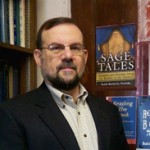Jews tend to be nervous about the numbers of Jews in the world, with a demographic anxiety that has become a major cottage industry. This anxiety is in the air again and back in the news, with the just-released surveys of Jews in America from Brandeis University and the Pew Research Center. But I want to suggest that the roots of this concern are quite old, hinted to as far back as in the promises to Abraham that recur throughout this week’s Torah portion.
First, in Genesis 12:2, God offers the promise to Abraham that he will be made into a great nation – not only for the sake of Abraham’s descendants, but in order to become a source of blessing for all the earth’s inhabitants. This initial blessing promising Abraham’s great legacy focuses on the outcome of what the Jewish people are meant to be in the world – and not the numbers of Jews who will signal their arrival.
But this promise is not enough. Abraham endures a close call with Pharaoh in Egypt, fearing the monarch would threaten his marriage to Sarah and the possibility of having an heir. Further, Abraham’s workers fight with those of his nephew Lot, resulting in the severing of his closest family relationship. It might seem to Abraham in this moment that the idea of his becoming the progenitor of a great nation is more implausible than ever.
So God makes a second promise (Genesis 13:16) that Abraham’s descendants will fill the great earth – all the land that he can see before him – innumerable as the dust of the ground. Abraham then obeys God’s command that he walk that very land, the act of which seems like the first anxious counting: How many here? How about now?
So this second effort by God is still too vague, and this promise again proves insufficient to placate Abraham’s demographic anxiety. And what’s more, this allegedly “promised” land is rife with war all around it – four kings battling against five others – which constrains that promised population to narrower boundaries; and then, of course, as Abraham reminds God, these promises also conflict with his and Sarah’s ongoing infertility.
So finally in Genesis 15:5, God not only offers a third, expanded promise, but also takes a different pedagogical approach. God asks Abraham outside and shows him the unbounded starry night: Count the stars, says God, and know that just as they are innumerable, so also will be your offspring. No longer a vague pledge of a great nation, no longer a bounded plot of land that will necessarily constrain their numbers: This is a promise of sheer demographic infinity, a secure sense that the numbers of his descendants will exceed his wildest expectations.
And rather tellingly, the Torah tells us that this final promise succeeds at alleviating his anxiety: “And he trusted in God, and reckoned this to him as righteousness.” This second clause confounds the classical commentators, who assume it means that since Abraham trusted God, God considered that trust an act of righteousness. I think the opposite reading is more intuitive: Since God was finally able to convince Abraham compellingly of the promise of offspring, Abraham responded by trusting in God’s righteousness. For the first time, Abraham’s mind was put at ease.
All of the present-day polls that indicate that the population of Jews is declining – or that thick Jewish identity is thinning – make us so anxious, and the case study of Abraham shows why. Abraham was given the initial mission for his life and his destiny in Genesis 12, but until his mind was put at ease that this legacy of descendants was literal and not merely metaphorical, he couldn’t focus on the mission. It is only after God conveys the message as clear as the stars in the sky in Genesis 15 that Abraham can move forward and begin embodying the responsibility of bringing justice and righteousness into the world. It is just three chapters after this story that Abraham feels emboldened to challenge God with the force of this righteousness on his side, questioning God’s decision to destroy Sodom.
The numbers of our people can distract us from the work of Jewishness, as we – like Abraham – live in fear that we will not have the critical mass to fulfill our hopes and aspirations, that our communities and therefore our contribution to the world will diminish and disappear.
I would like to suggest that knowing that the anxiety about our numbers is rooted deeply in our collective memory—going all the way back to the stories of Abraham—can be helpful to our emotional health as a people. We have never been a significant percentage of the world population, and so there has always been a gap between our sense of responsibility for the world and the depth of our bench to achieve these lofty goals. Left unsolved – as the population ‘crises’ of today seem to be – an anxiety like this, as with anxieties in general, can spiral us uncontrollably towards a wide range of programmatic and policy experiments.
Some in the community will respond to this anxiety with a push towards a focus on in-marriage, higher boundaries between Jews and non-Jews, and the need to promote earlier (and more frequent!) Jewish childbirth. Others – equally concerned about the place of Jews in the world, but perhaps less attached to the same essential definitions of what constitutes Jewishness – will decry efforts to produce more Jews just for the sake of the numbers, and will push the communal discourse towards trying to make Judaism meaningful. This argument critiques continuity as an insufficient independent value, instead arguing that only if Judaism stays relevant will it – and should it – continue to reproduce itself.
Both sides of these frequent and public arguments, I believe, care about the strength and vitality of the Jewish people – even if the culture of polemic that sometimes characterizes public Jewish discourse seems to require both sides to castigate one another – and I would suggest both share this almost ancestral concern with what our future legacy will be.
But no policy solutions can compare to the assurances that God gave Abraham, and I doubt our people will ever have the luxury of being secure in our demographic health. Unlike Abraham, we cannot wait for a promise to put us at ease. The challenge for Jews today is to continue to use this anxiety as a catalyst to look forward rather than back, to not be crippled by an anxiety about what will come after us so much that we forget to pave the way. Rather than looking with envy at the stars in the sky or the dust of the earth, rather than obsessing with what we are doing wrong as a people that makes our numbers decrease rather than increase, the timely lesson of Abraham is to finally trust in the promise of a future that in the moment still seems uncertain – to pause from the anxiety and credit the calm to God as righteousness – and then to get to work bringing that righteousness to the world.
Dr. Yehuda Kurtzer is President of the Shalom Hartman Institute of North America, a Fellow of the Hartman Institute’s iEngage project, and the author of the newly released Shuva: The Future of the Jewish Past (Brandeis, 2012.) He was previously the inaugural Charles R. Bronfman Chair of Jewish Communal Innovation at Brandeis University. Yehuda has a doctorate from Harvard in Jewish Studies, an MA in Early Christianity from Brown, and was a Wexner Graduate Fellow. Yehuda co-founded Brookline’s Washington Square Minyan and lectures widely in the North American Jewish community.
ON Scripture — The Torah is a weekly Jewish scriptural commentary, produced in collaboration with Odyssey Networks and Hebrew College. Thought leaders from the United States and beyond offer their insights into the weekly Torah portion and contemporary social, political, and spiritual life.
















